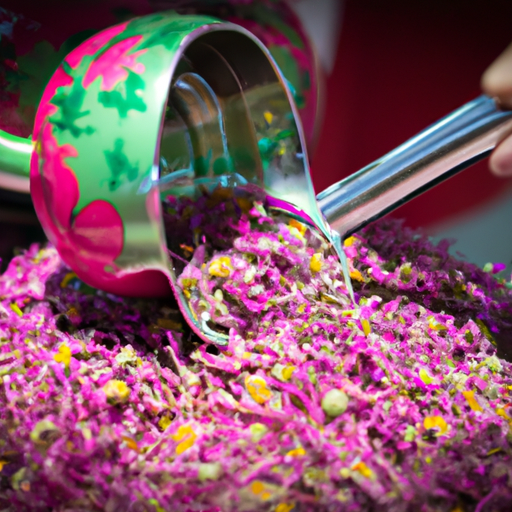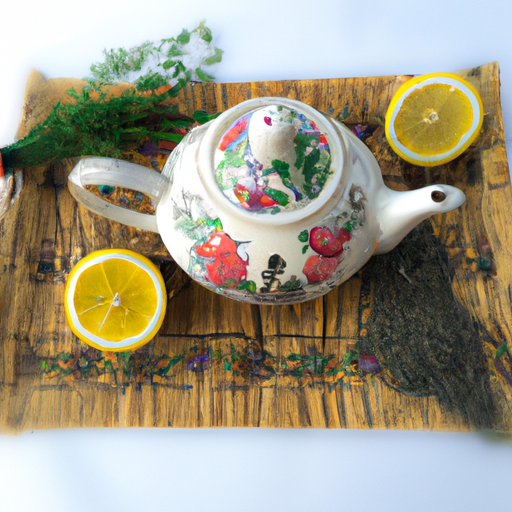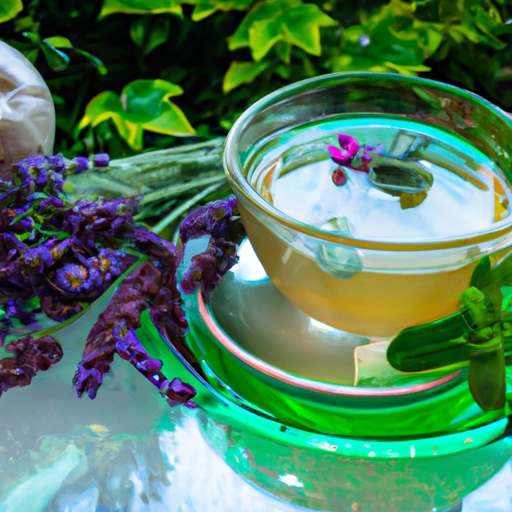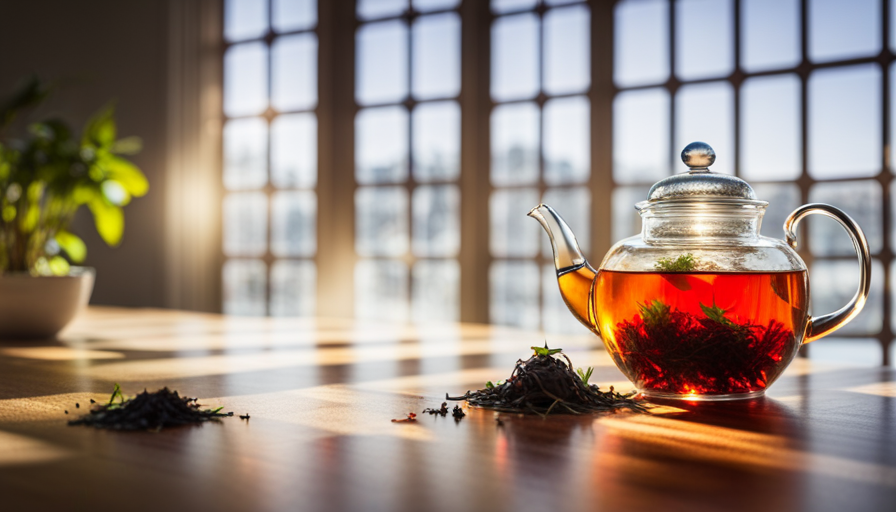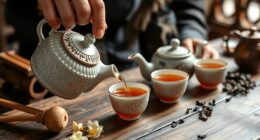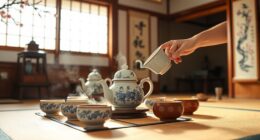Imagine yourself sitting in a cozy corner, wrapped in a warm blanket, sipping a steaming cup of herbal tea. As you take a deep breath, you can feel the tension melt away from your body, leaving you in a state of pure relaxation.
Herbal tea has a remarkable ability to calm our minds, soothe our souls, and restore balance to our hectic lives. But have you ever wondered why herbal tea has such a profound effect on our well-being?
In this article, we will explore the science behind herbal tea’s relaxing properties and uncover its many benefits. From promoting sleep to reducing stress and improving digestive health, herbal tea offers a natural and holistic approach to relaxation.
So, join me on this journey as we delve into the world of herbal tea and discover how it can help us find tranquility in the midst of our busy lives.
Key Takeaways
- Herbal tea has calming effects on the body and mind, promoting relaxation and reducing anxiety.
- Compounds like apigenin in chamomile and linalool in lavender have sedative properties that promote relaxation and sleep.
- Herbal tea lowers cortisol levels, the stress hormone, promoting calmness and tranquility.
- The aroma of chamomile or lavender-infused herbal tea can further promote relaxation and reduce anxiety.
The Benefits of Herbal Tea for Relaxation
Herbal tea, with its unique blend of natural ingredients, has been found to have a calming effect on the body and mind, making it a popular choice for relaxation. There are different types of herbal tea that can aid in relaxation, such as chamomile, lavender, and lemon balm. These herbs have been used for centuries to promote relaxation and reduce anxiety.
The best time of day to drink herbal tea for relaxation depends on personal preference, but many people find it helpful to have a cup in the evening before bed or during a stressful moment in the day. Herbal tea can play a vital role in promoting sleep, as it helps to soothe the mind and prepare the body for rest.
So, let’s explore how herbal tea can help us achieve a more restful sleep.
The Role of Herbal Tea in Promoting Sleep
Feeling restless at night? Ever wondered how a warm cup of chamomile or lavender-infused beverage can help you drift off into a peaceful slumber? Herbal tea has long been known for its calming effects on the body and mind. It can alleviate anxiety and promote relaxation, making it the perfect bedtime companion. The impact of herbal tea on anxiety is due to its natural compounds, such as chamomile’s apigenin or lavender’s linalool, which have sedative properties. Additionally, herbal tea can improve sleep quality by reducing sleep disturbances and increasing overall sleep duration. It works by interacting with receptors in the brain, promoting the release of neurotransmitters that induce relaxation and sleepiness. So next time you’re struggling to fall asleep, consider reaching for a soothing cup of herbal tea. It’s nature’s way of helping you unwind and prepare for a restful night’s sleep. In the next section, we’ll explore the science behind herbal tea’s relaxing properties.
The Science Behind Herbal Tea’s Relaxing Properties
Ever wondered how a warm cup of chamomile or lavender-infused beverage can help you drift off into a peaceful slumber? It’s fascinating to delve into the science behind the calming properties of these soothing brews.
Herbal teas, such as chamomile and lavender, contain compounds that have been found to have anxiety-reducing effects. One such compound is apigenin, which binds to specific receptors in the brain to induce a sense of relaxation.
Additionally, herbal teas have been shown to lower cortisol levels, the hormone associated with stress. By reducing cortisol, herbal teas help regulate the body’s stress response, promoting a state of calmness and tranquility.
As we explore the connection between herbal tea and stress reduction, we continue to unravel the mysteries of these natural remedies.
Herbal Tea and Stress Reduction
One fascinating statistic to consider is that consuming chamomile or lavender-infused beverages has been found to lower cortisol levels, helping to regulate the body’s stress response. This natural remedy has been used for centuries to promote relaxation and reduce anxiety.
Here are four ways herbal tea can help with stress reduction and mood enhancement:
-
Calming effects: The soothing properties of herbal tea can help calm the mind and promote a sense of relaxation, making it an excellent choice for those dealing with anxiety or stress.
-
Natural remedies: Unlike medications, herbal tea provides a natural alternative for relieving stress and enhancing mood without the potential side effects.
-
Aromatherapy benefits: The aroma of chamomile or lavender-infused herbal tea can have a calming effect on the senses, further promoting relaxation and reducing anxiety.
-
Ritualistic experience: The act of preparing and sipping herbal tea can be a mindful and soothing practice, allowing for a moment of self-care and stress relief.
With its numerous benefits for stress reduction and mood enhancement, herbal tea is not only beneficial for our mental well-being but can also have positive effects on our digestive health.
Herbal Tea and Digestive Health
When it comes to herbal tea and digestive health, I’ve found that it has a soothing effect on my digestive system. It helps to calm any discomfort or bloating I may be experiencing.
Additionally, herbal tea promotes gut health by aiding in digestion and supporting the growth of beneficial gut bacteria.
Lastly, it has been shown to reduce inflammation in the digestive tract, which can be beneficial for those with digestive disorders.
Soothing Effects on the Digestive System
Herbal tea has soothing effects on the digestive system because it alleviates inflammation and promotes healthy gut function. When I sip on a warm cup of herbal tea, I can feel its gentle nature calming my stomach and easing any discomfort.
The natural ingredients found in herbal teas, such as chamomile, peppermint, and ginger, have been used for centuries to aid digestion and soothe the digestive tract. These herbs have anti-inflammatory properties that help reduce inflammation in the gut, allowing it to function optimally.
Additionally, herbal teas can stimulate the production of digestive enzymes, further aiding in the breakdown and absorption of nutrients. By promoting gut health and reducing inflammation, herbal tea acts as a natural remedy for digestive issues and supports overall well-being.
Promoting Gut Health and Reducing Inflammation
Sipping on a warm cup of herbal tea feels like a gentle hug for my stomach, as it works wonders in promoting gut health and reducing inflammation. Herbal teas, with their natural properties, have a soothing effect on the digestive system, helping to calm any discomfort or bloating.
When it comes to promoting gut health, herbal teas are a wise choice. Here’s why:
-
Nurturing the microbiome: Herbal teas contain compounds that nourish and support the good bacteria in our gut, creating a healthy environment for digestion.
-
Anti-inflammatory properties: Many herbal teas, such as chamomile and ginger, have anti-inflammatory effects that can help reduce inflammation in the gut, easing symptoms like cramping and pain.
-
Soothing the digestive lining: The gentle nature of herbal teas can help soothe and repair the lining of the digestive tract, reducing irritation and promoting healing.
Incorporating herbal tea into your daily routine allows you to embrace a natural and holistic approach to gut health. It’s a simple and enjoyable way to support your body’s well-being.
Incorporating Herbal Tea into Your Daily Routine
Adding herbal tea to my daily routine is like inviting a soothing and calming oasis into my busy day. It’s a natural and holistic way to relax and unwind. There are many different types of herbal teas to try for relaxation, such as chamomile, lavender, and peppermint. Each tea has its own unique properties that can help promote calmness and reduce stress. Incorporating herbal tea into my evening routine has been especially beneficial for better sleep. Sipping on a warm cup of herbal tea before bed helps to relax my mind and body, creating the perfect environment for a restful night’s sleep. As I wind down with a comforting cup of herbal tea, I feel the tension melt away and a sense of tranquility wash over me. It’s a simple and enjoyable ritual that helps me find peace in the midst of a hectic day. Transitioning into the subsequent section about ‘conclusion: harnessing the power of herbal tea for relaxation’, I have discovered that herbal tea is not just a beverage, but a powerful tool for finding inner calm and serenity.
Conclusion: Harnessing the Power of Herbal Tea for Relaxation
By incorporating herbal teas into our daily routines, we can tap into the power of these natural remedies to promote relaxation and reduce stress, ultimately improving our overall well-being. Did you know that a study found that drinking herbal tea regularly can lead to a significant decrease in anxiety levels?
Here are four ways herbal tea can help you relax and find inner peace:
-
Herbal tea recipes: Try lavender and chamomile tea before bed to promote a restful night’s sleep.
-
Calming effects: Certain herbs like lemon balm and passionflower have calming properties that can help reduce stress and anxiety.
-
Ritual of self-care: Preparing a warm cup of herbal tea can be a soothing ritual that helps you unwind and focus on the present moment.
-
Mindful relaxation: Taking a break with a cup of herbal tea can create a mindful moment of relaxation, allowing you to recharge and find balance in your day.
Incorporating herbal tea into your daily routine can be a simple yet effective way to harness its power for relaxation and stress reduction. So, why not take a moment for yourself and enjoy a cup of herbal tea today?
Frequently Asked Questions
What are some common herbal teas that are known for their relaxation properties?
Some common herbal teas known for their relaxation properties include chamomile, lavender, and valerian root. These teas have calming effects on the body and can help promote relaxation, reduce stress, and improve sleep quality.
Can herbal tea help with anxiety and promote a sense of calm?
Herbal tea can be a natural alternative to prescription anti-anxiety medications. I’ve found that sipping on a warm cup of chamomile tea helps me unwind and promotes a sense of calm, without the side effects of medication.
Is it safe to consume herbal tea daily for relaxation purposes?
In my experience, daily consumption of herbal tea for relaxation purposes can be safe. However, it is important to consider the long-term effects and choose the right herbal tea that suits your needs. Consulting with a healthcare professional is recommended.
Are there any potential side effects or interactions with medications when consuming herbal tea for relaxation?
When consuming herbal tea for relaxation, it’s important to be aware of potential side effects, precautions, and interactions with medications. Additionally, how does herbal tea compare to other relaxation methods in terms of effectiveness?
How long does it typically take for herbal tea to have a relaxing effect on the body?
Herbal tea typically relaxes me within 20-30 minutes. The speed of relaxation can vary depending on factors like the type of tea, brewing method, and individual sensitivity.
Conclusion
In conclusion, herbal tea is a wonderful natural remedy for relaxation and promoting overall well-being. Its calming properties help to alleviate stress and anxiety, allowing us to unwind and find inner peace.
One interesting statistic is that a study found that people who drank herbal tea regularly experienced a 20% decrease in stress levels compared to those who didn’t. This highlights the significant impact that herbal tea can have on our mental and emotional health.
By incorporating herbal tea into our daily routine, we can harness its power to find tranquility and balance in our lives.


